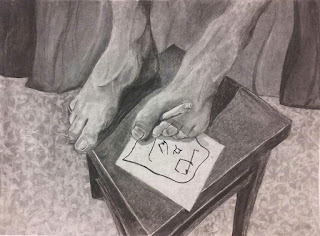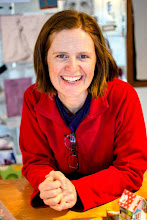
Here is all we did:
- Hands and feet studies (you can see my hands drawing here)
- Self portrait (you can see mine here)
- Bones and muscles study
- Animation
- Still life with model
- Large scale group collaboration
- 6-minute class presentations about a figurative artist
Honestly, I could do an entire blog post about each thing. (Indeed, I have about two of them already.) Instead of talking about each thing, I want to talk about my takeaways.
(FYI--all of these drawings are mine, from these projects, with exception of the very last photo, which is duly credited there. Click on any image for a close-up.)
I've said it before: in our culture, "artist" is not considered a legitimate profession to aspire to once one is of the age to start making some actual career decisions. Brené Brown once made a joke about how people might say: "Well, you go ahead, dear, with your A-R-T, and I'll get on with my J-O-B!"
Amy Misurelli Sorenson is a visiting artist at Colorado State University. It was recommended to me that I take figure drawing from her. I consider this to have been divine intervention. The way she approaches drawing is as if it is her right hand.
She told a story of when she was working 60 hour weeks in a gallery and she'd come home exhausted, with no more energy to give and all she'd want to do is sit at her kitchen table and draw. Not go to bed, not watch TV, not veg on the couch. Drawing is in her.
If you view her website, you'll see that she pushes people out of their comfort zones with her drawings, prints, photos, and even performance art. As an instructor, she asked us, even demanded that get out of our comfort zones. She insisted that we draw well from observation. During critique, she was honest, didn't sugar coat, and asked people to push themselves even more beyond what they'd done.
Even if cell phone selfies have "put artists out of a job," people of this day and age will still pay for a drawn or painted portrait, illustrations of anatomy, animation (think of the thousands of animated videos that exist in the world).
Being an artist most often means you make your own thing in your space all by yourself, but being an artist can also mean collaborating with other people with different styles and perspectives to make something more than what you'd ever be able to do just on your own.
Taking figure drawing with Amy legitimized drawing for me in a new way, and legitimized the value of the human figure to me even more. Before this class, I was intimidated to draw a human, whether just a part of it, like the face, or the entire thing.
I was surprised when I said to my model for the still life (second image in this post) that drawing her was not at all what I was worried about. It was the space around her, the other objects, her comfort, and my paper choice that I was concerned most about.
Even our figurative artist presentations were more rewarding than I thought they would be. First, I was able to explore the life and art of an artist I have long admired: Hung Liu.
Liu is a figurative oil painter who lives in the Bay Area. She even taught at Mills College when I was there in the late 90s (missed opportunity!).
Here is a photo I took in 2015 of one of Liu's paintings, called Shoemakers, made in 1999. It is owned by the Crocker Museum in Sacramento, CA.
All the students in my class did brief presentations about other contemporary figurative artists, and right away this information paid off when I went to the Seattle Art Museum in mid-May, only to see in-person original paintings by Kehinde Wiley, David Salle, and Eric Fischl. These are living contemporary figurative artists, making a buck by making art. Moreover, all of these artists communicate and create in ways that include depicting the human figure.
The significance of understanding this overwhelms me and causes me to believe that one day I, too, could make something that someone will pay for and shoot, maybe even put it in a museum.
As I said before, taking Figure this semester, with this instructor, with the skills I've built up over the last few years, and with the appreciation I have for art museums (newly found in just the last 4 years): divine intervention.
















No comments:
Post a Comment